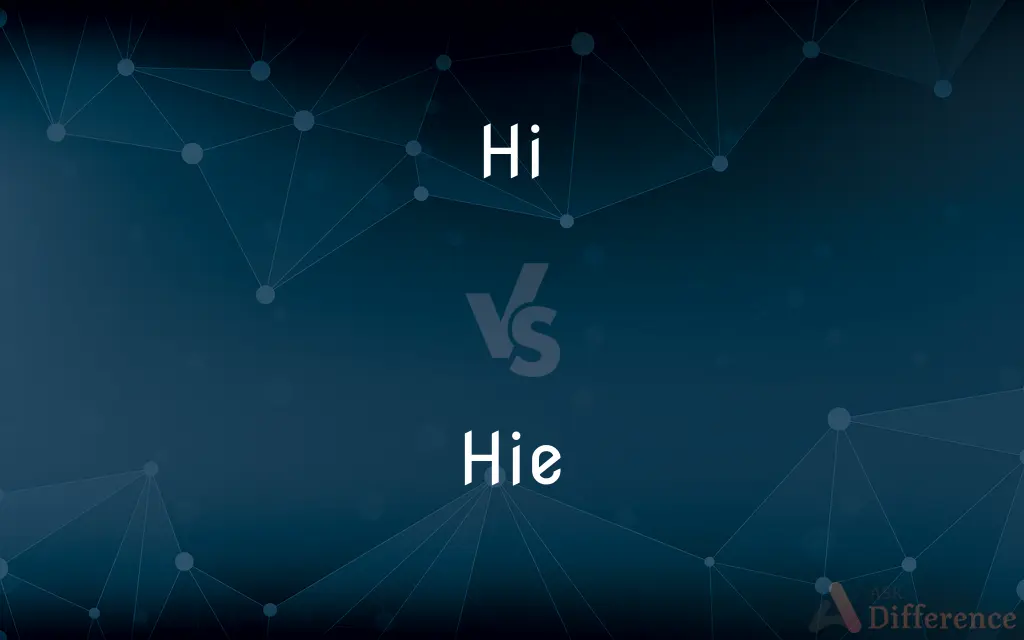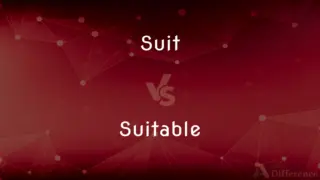Hi vs. Hie — What's the Difference?
By Tayyaba Rehman — Updated on January 14, 2024
"Hi" is a common, informal greeting used in English, while "hie" is an archaic term meaning to go quickly or to hasten.

Difference Between Hi and Hie
Table of Contents
ADVERTISEMENT
Key Differences
"Hi" is a widely recognized and used form of casual salutation in modern English, often used in both spoken and written contexts. "Hie," on the other hand, is seldom used in contemporary language and is more likely to be found in historical or literary texts.
The usage of "hi" transcends age, geography, and formalities, making it a versatile greeting. In contrast, "hie" is typically associated with older English usage and conveys a sense of urgency or speed.
"Hi" can be a standalone greeting or part of phrases like "Hi there" or "Hi everyone." "Hie," being a verb, is used in contexts like "hie to the market" or "hie thee hence," often seen in older English literature.
"Hi" has no implications of action or movement, being purely a greeting. "Hie" implies action, specifically to go quickly or hurry, and is often used as a command or suggestion.
In terms of frequency, "hi" is part of everyday language, while "hie" is rare and might not be understood in casual conversation without context.
ADVERTISEMENT
Comparison Chart
Meaning
A casual greeting
To go quickly or to hurry
Usage
Common in modern language
Archaic, rare in contemporary use
Context
Informal and versatile
Historical or literary
Implication
No action implied
Implies action or movement
Frequency
Everyday use
Rarely used
Compare with Definitions
Hi
A casual greeting.
Hi, how are you doing today?
Hie
Used in literary or historical contexts.
The messenger was told to hie himself to the king.
Hi
Suitable for informal contexts.
Hi, can I join you?
Hie
Used as a command for quick action.
Hie, we have no time to waste!
Hi
Used in both spoken and written English.
I started the email with a simple 'Hi'.
Hie
Implies urgency.
Hie thee to safety, the storm approaches!
Hi
An expression of greeting;
Every morning they exchanged polite hellos
Hie
To go quickly.
Hie to the store before it closes.
Hi
Can be used to greet any individual.
Hi, I haven't seen you in ages!
Hie
Often found in older English literature.
In Shakespeare's plays, characters often 'hie' to their destinations.
Hi
Used to express greeting. See Note at hey.
Hie
Go quickly
I hied me to a winehouse
I hied down to New Orleans
Hi
A friendly, informal, casual greeting said upon someone's arrival.
Hi, how are you?
I just dropped by to say “hi”.
Hie
To go quickly; hasten.
Hi
An exclamation to call attention.
Hie
To hasten; to go quickly, to hurry.
Hi
(dated) Expressing wonder or derision.
Hie
To hurry (oneself).
Hi
The word "hi" used as a greeting.
I didn't even get a hi.
Hie
To hasten; to go in haste; - also often with the reciprocal pronoun.
The youth, returning to his mistress, hies.
Hi
Informal spelling of high, often in hyphenated terms.
Get hi-quality videos here!
Hie
Haste; diligence.
Hi
A state in the United States in the central Pacific on the Hawaiian Islands
Hie
Step on it;
He rushed down the hall to receive his guests
The cars raced down the street
Hi
Often used to start a conversation.
He waved and said 'hi' as he walked past.
Common Curiosities
Was "hie" commonly used in Old English?
"Hie" was more commonly used in Middle and Early Modern English than Old English.
Is "hie" still commonly used today?
No, "hie" is an archaic term and rarely used in modern English.
Can "hi" be used in text messages?
Yes, "hi" is commonly used in texts as a casual greeting.
Are there variations of "hi" in other languages?
Many languages have similar informal greetings, but they may differ phonetically and culturally.
Is "hie" found in modern dictionaries?
Yes, "hie" is still listed in dictionaries but often marked as archaic or literary.
Can "hi" be used in formal communication?
"Hi" is generally informal; "hello" or other formal greetings are preferred in formal settings.
Does "hie" have any synonyms in contemporary language?
Modern synonyms for "hie" include "hurry," "rush," or "speed."
Is "hi" considered slang?
"Hi" is informal but not typically considered slang.
Is "hi" appropriate in all cultures?
While widely recognized, cultural norms for greetings vary, and "hi" may not always be appropriate.
Can "hie" be used in modern writing?
"Hie" can be used for stylistic or historical effect in modern writing.
How is "hie" used in poetry?
In poetry, "hie" is used for its archaic tone and to convey urgency or rapid movement.
Do people still understand the meaning of "hie"?
Its meaning may not be immediately known to many modern English speakers without context.
Can "hie" be replaced with "go quickly" in all contexts?
In most cases, "go quickly" or "hurry" can be used as a modern equivalent to "hie."
Does "hie" appear in religious texts?
"Hie" may appear in older translations of religious texts but is less common in contemporary versions.
Is "hi" a universal greeting?
While widely understood, it's not universal, as greeting customs vary globally.
Share Your Discovery

Previous Comparison
Provide vs. Offer
Next Comparison
Suit vs. SuitableAuthor Spotlight
Written by
Tayyaba RehmanTayyaba Rehman is a distinguished writer, currently serving as a primary contributor to askdifference.com. As a researcher in semantics and etymology, Tayyaba's passion for the complexity of languages and their distinctions has found a perfect home on the platform. Tayyaba delves into the intricacies of language, distinguishing between commonly confused words and phrases, thereby providing clarity for readers worldwide.
















































